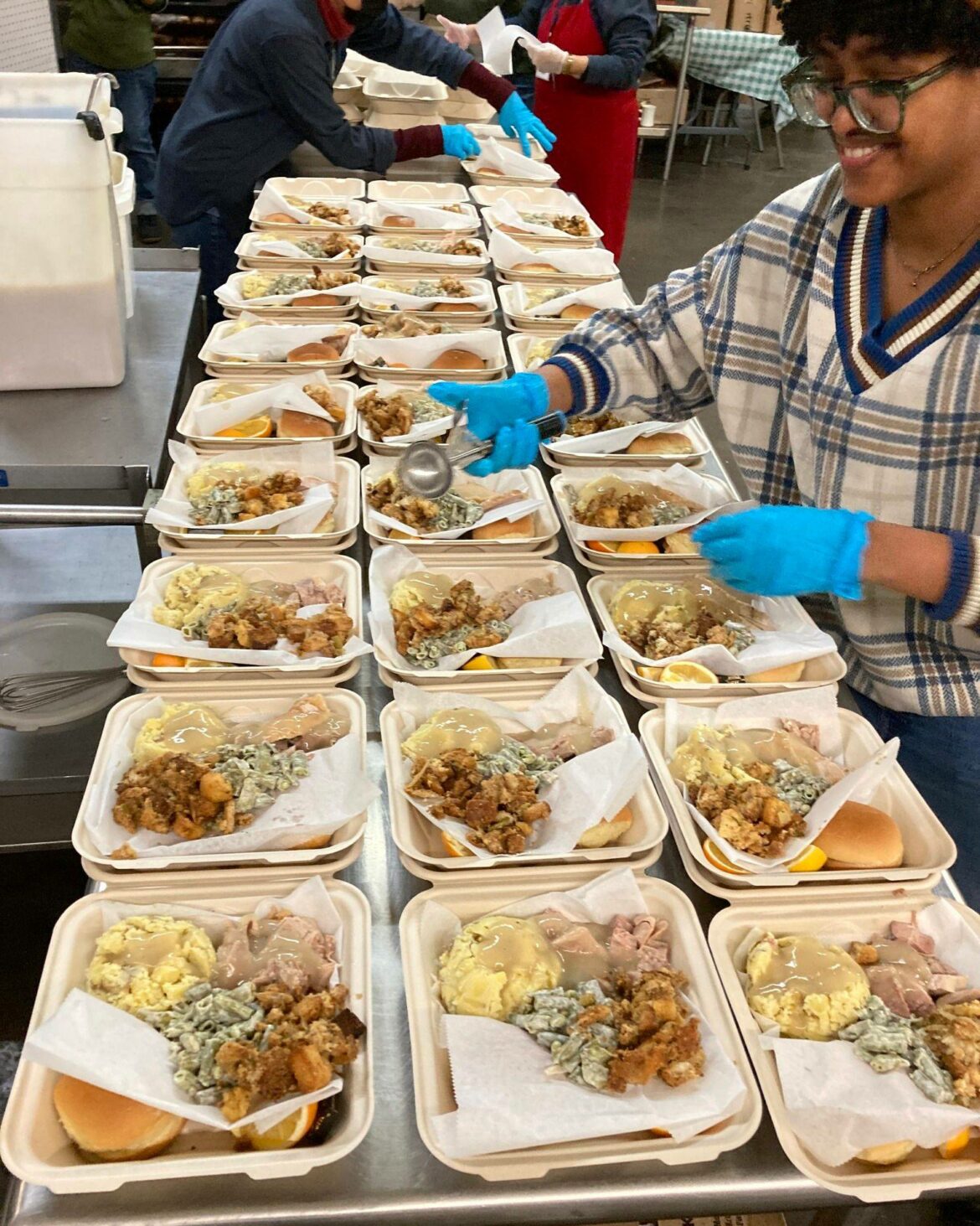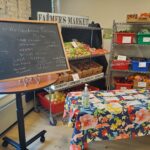Inflation has skyrocketed housing expenses, gas prices and grocery bills. These soaring costs have left families in a pinch, leading them to seek out their local food pantries for relief.
Dane County food pantries are now feeding more than twice as many households than in 2021, according to a joint press release in December from five Dane County food pantries.
Not only are community members in need of food and support, but food pantries are also searching for volunteers and donations.
There are several food pantries and food service organizations in the Madison area. Here is a look inside a few that provide a variety of services for those facing food insecurity.
The River Food Pantry
The River Food Pantry is South Central Wisconsin’s busiest food pantry, serving more than 2,000 individuals each week, said Helen Osborn-Senatus, the director of operations for the River Food Pantry. Located on the north side of Madison, the pantry provides seven different food distribution programs, including free groceries and freshly prepared meals for pickup or delivery, online grocery orders and mobile meals. In 2021, it gave out nearly 59,000 to-go meals through FAM, their family at-home meals program and distributed more than 7,500 deliveries of groceries to the homebound through River Delivers.
The River is also the first redistribution organization for Second Harvest, a food bank located in southern Wisconsin. This means they give any extra food they have to other agencies. Currently, the River partners and shares food with 17 other local agencies, such as after school programs and local men’s homeless shelters.
The main program that the River provides is their on-site pantry, which is open from Tuesday through Friday. This service allows individuals to pick up 80-85 pounds of groceries which can include a variety of perishable and nonperishable items. There is also a menu system that households can register for and choose which groceries they receive. Those in need of food can come to the on-site pantry once per week which currently remains a drive-through service.
“We know people are facing food insecurity and we don't want anybody going hungry. And just the fact that we know that that's happening, keeps us working harder and harder to try and reach as many people as possible,” Osborn-Senatus said.
To keep this organization thriving, the River needs a lot of volunteers and donations, especially during a time of rising prices and higher demand. According to Osborn-Senatus, there are 24 people on staff at the River Food Pantry, accompanied by about 300 volunteer shifts. In 2021, the River saw more than 2,000 volunteers who put in a total of almost 30,000 volunteer hours. The pantry welcomes individual and group volunteers.
“Whether you're coming to us for food or coming to us to volunteer, we want to make sure that you know that you are valued and that there is no shame in coming to a food pantry,” said Osborn-Senatus.
St. Vincent de Paul-Madison Food Pantry
The St. Vincent de Paul-Madison Food Pantry is one of the largest pantries in Dane County and provides an outdoor drive-through grocery service, an online ordering system for pick up at the pantry and free grocery delivery through DoorDash. The pantry is open Monday, Tuesday, Thursday and Friday and can also provide household items that government assistance won’t cover, such as laundry detergent and diapers.
St. Vincent de Paul-Madison is a member of the Madison area’s food pantry gardens and has a garden in Fitchburg where volunteers plant, grow and harvest produce during the growing season. This food is taken to the pantry and distributed into the community.
In November of 2022, the St. Vincent de Paul-Madison pantry served 2,221 households which is about 170 households per pantry day, according to its communications manager Katherine Higgins. She also said there has been a substantial increase in demand since spring of 2022. Currently, the pantry serves more than 120 individuals per pantry day, compared to the 60 to 90 individuals served in May.
“The numbers have definitely increased due to inflation and high prices for everything. The compounding effects of how costly things are for folks who are already struggling just adds up very quickly,” Higgins said.
Along with the food pantry, St. Vincent de Paul-Madison has the only charitable pharmacy of its kind in the state, which provides free prescriptions to those in need. They also have a men’s housing program, a poverty remediation service for families and seven thrift stores throughout Dane County.
“Our mission is to help people who are coping with poverty, whether that’s long-term support or just when they need it,” Higgins said.
Goodman Community Center
Located on the east side of Madison, the Goodman Community Center serves people of all ages with its children and youth programs, senior services, fitness center, event spaces, meals and food pantry.
Open Tuesday through Thursday, the Fritz Food Pantry at the Goodman Community Center provides groceries for more than 200 households every week, according to Fritz Food Pantry Manager Francesca Frisque.
Individuals can visit the pantry once per week and can find a mix of fresh produce from local farmers, bakery items, dairy products, eggs, meat and dry goods.
The pantry follows a full choice model, which means people can take what they need based on their household size. If someone has difficulty getting into the building, Fritz also operates a curbside pantry every Tuesday where volunteers bring out the desired groceries to the individual’s vehicle.
Like most food pantries in the area, Fritz is facing challenges with higher demand and not enough help. According to Frisque, it’s getting harder for them to keep up with the quick pace.
“I think it’s hard because sometimes people have a very set notion of what they think volunteering will be like but it’s not always something that makes you get all the warm fuzzies,” said Frisque.
If people are looking to help their local food pantries, Frisque suggests hosting a food drive. A list of tips on how to do that and what kind of food is needed can be found on the Goodman Community website. Currently, the most needed items are cereal, pasta and toilet paper.
Slow Food UW
Slow Food UW is an established nonprofit organization that provides good, clean and fair food for all members of the community to help fight food insecurity.
Located in the basement of The Crossing on 1127 University Ave., Slow Food UW features two main programs that provide meals for the community: Café and Family Dinner Night.
According to Slow Food UW Co-Executive Director Angelina Mico, Slow Food UW doesn’t include meat or fish in their meals for cost and safety reasons.
Café happens Wednesdays from 12-2 p.m. The menu always includes a main entrée, sides, a drink and a dessert, which all vary based on seasonality and locality. This program is à la carte style, which means that individuals can purchase items separately or they can pay for “the works” to get everything on the menu.
Family Dinner Night occurs Monday nights at 6:30 p.m. and includes a three-course meal consisting of an appetizer, entrée and dessert. For the first time all semester, Slow Food UW is piloting a “pay what you can” donation model for this meal.
“People can choose to donate or just pay what they can for a meal. Whether it’s 25 cents or $50, they can pay whatever they’re able. No questions asked,” said Mico, who also said this model is more sustainable and equitable.
According to Mico, it’s been challenging to predict how many people will come to their meals and if they will have enough volunteers to help prepare and serve food. Volunteers typically cook for about 100 people but are hoping to reach more members of the community with their meals.
“Slow Food is a registered student organization, but anyone can come. Anyone who wants a nice nutritious meal is welcome,” Mico said.
As grocery prices rise and demand for food increases, Slow Food UW is struggling to gain enough funds to purchase the ingredients for each meal.
“We’ve had to make decisions to up our prices because frankly we are losing hundreds of dollars every single week, especially at the start of the semester,” Mico said.
Mico said Slow Food UW wants to encourage people to come to their meals, donate if they are able and help spread awareness that they are an organization working hard to help those in need.
HOW TO HELP
If you’re interested in staying up to date, learning more information or volunteering, here is how to connect with these Dane County organizations.
-The River Food Pantry: https://www.riverfoodpantry.org/ or call (608) 442-8815.
-Slow Food UW: https://slowfood-uw.org/. Menu updates and details about the organization can also be found on Slow Food UW’s Facebook and Instagram pages.
-Goodman Community Center website at https://www.goodmancenter.org/ or call (608) 241-1574
-St. Vincent de Paul-Madison website at https://svdpmadison.org/ or call (608) 257-0919.













